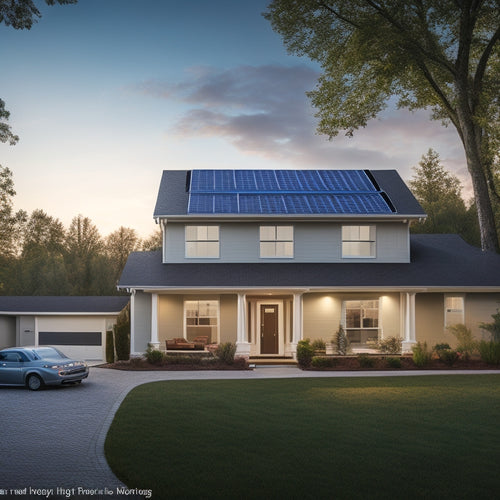
Solar Panel and Battery System for Home
Share
With a solar panel and battery system, you can convert your home into an independent energy hub, utilizing renewable energy and reducing your reliance on the grid by up to 90%. By capturing solar energy during the day and storing excess for later use, you'll guarantee a reliable electricity supply during outages and peak demand. This setup promotes a sustainable lifestyle, minimizing grid fluctuations and costs, while contributing to a reduced carbon footprint. As you investigate the world of solar panel and battery systems, you'll uncover how to optimize your energy usage, assess your energy demands, and access the full potential of your renewable energy investment.
The Essentials
- Solar panel and battery systems enable energy self-sufficiency, reducing reliance on the grid and fossil fuels, and promoting a sustainable lifestyle.
- Advanced power optimization capabilities in solar systems minimize energy waste, leading to cost-effective and efficient solar power generation.
- Correctly sizing a solar panel and battery system requires understanding daily energy usage patterns and appliance power requirements.
- High-quality inverters with Maximum Power Point Tracking (MPPT) ensure stable and efficient power conversion from DC to AC for home use.
- Larger battery banks provide reliable power backup during grid outages, ensuring essential appliances remain powered during low sunlight periods.
Renewable Energy Independence Guaranteed
You're now one step closer to achieving energy self-sufficiency with your solar panel and battery system, which generates clean energy and stores excess power for later use.
By integrating a battery storage system into your solar setup, you'll release the full potential of renewable energy and create a more sustainable, dependable, and cost-effective power solution Energy Storage Solutions.
This setup guarantees renewable power freedom, allowing you to break free from reliance on the grid and reduce your carbon footprint.
Energy Self-Sufficiency Now
Achieving energy self-sufficiency now is no longer a distant dream, thanks to the rapid advancements in solar panel and battery system technology.
You're on the cusp of releasing true energy autonomy, where your home generates and stores its own power, free from the grid's constraints.
With a well-designed solar panel and battery system, you'll be producing clean energy and storing it for later use, reducing your reliance on fossil fuels and lowering your carbon footprint.
By leveraging home battery storage solutions, you can solve three major problems: reducing your reliance on the grid during power outages, lowering your electricity bills, and shaving peak demand charges.
This means you can enjoy a sustainable lifestyle, liberated from the grid's fluctuations and rate hikes.
Renewable Power Freedom
With the solar panel and battery system in place, you're ready to access Renewable Power Freedom, where your home becomes an independent energy hub, generating and storing clean power on its own terms.
This means you're no longer tied to the grid, and you can enjoy the benefits of solar freedom, energy autonomy, and a sustainable lifestyle. By utilizing solar energy and storing excess power with advanced battery storage solutions, you'll have a reliable and efficient source of energy.
You'll have the power independence to generate electricity on your own schedule, without relying on utility companies or fossil fuels. Your solar panel system will capture the sun's energy during the day, and your battery system will store excess energy for later use, providing a reliable and consistent power supply.
This setup guarantees you'll have a steady flow of electricity, even during outages or peak demand periods.
With Renewable Power Freedom, you'll reduce your reliance on the grid and lower your energy bills. You'll also contribute to a cleaner environment by minimizing your carbon footprint.
Reduced Carbon Footprint Guaranteed
By integrating a solar panel and battery system into your home, you'll greatly reduce your reliance on fossil fuels and lower your carbon emissions.
This eco-friendly solution enables you to minimize your environmental impact while enjoying energy independence.
With the help of efficient and durable house solar panels, you can maximize your energy harvest and reduce your reliance on the grid.
Eco-Friendly Home Solutions
One significant advantage of integrating a solar panel and battery system into your home is that it offers a multitude of eco-friendly solutions. By utilizing renewable energy from the sun, you're reducing your reliance on fossil fuels and decreasing your carbon footprint. This means you'll be producing clean energy that's sustainable and non-polluting, aligning with your values of sustainable living.
The green technology behind solar panels and battery systems guarantees that you're not only reducing your environmental impact but also contributing to a cleaner, healthier environment for future generations.
With a solar panel and battery system, you'll be generating electricity on-site, reducing the need for grid electricity and minimizing transmission losses. This decentralized approach to energy production gives you more control over your energy usage and reduces your dependence on the grid.
Energy Efficient Living
Your roof becomes a power plant when you integrate a solar panel and battery system into your home, generating clean energy that reduces your reliance on the grid and slashes your carbon footprint.
This setup enables you to adopt energy-efficient living practices, minimizing your impact on the environment while maximizing your energy independence. By utilizing renewable energy, you'll greatly decrease your energy consumption from non-renewable sources, reducing your carbon footprint and contributing to a cleaner, healthier environment.
To optimize your energy conservation strategies, consider implementing sustainable living practices in your daily routine. Simple actions like switching to energy-efficient appliances, turning off lights and electronics when not in use, and insulating your home can make a considerable difference.
Inverter Converts DC Power
You'll need an inverter to convert the DC power generated by your solar panels and stored in your batteries into AC power, which is what most homes use.
This conversion is essential since DC power can't directly power your appliances and devices.
With a reliable renewable energy storage system, you can guarantee a steady supply of energy even during outages.
The inverter's efficient power conversion guarantees you get the most out of your solar energy system.
DC to AC Conversion
Converting DC power from solar panels or batteries to AC power for home use requires an efficient and reliable inverter. You need a device that can efficiently convert the DC power advantages you're utilizing from the sun or storing in your batteries into usable AC power for your home. That's where inverter technology comes in.
A high-quality inverter guarantees a stable and consistent AC output, making it possible to power your appliances and electronics.
When selecting an inverter, consider the type of DC power source you're working with, as well as the AC power requirements of your home. You'll want an inverter that can handle the maximum DC input from your solar panels or batteries, while also providing a stable AC output that meets your power needs.
Look for an inverter with a high efficiency rating, as this will minimize energy losses during the conversion process. By choosing the right inverter, you can unleash the full potential of your solar panel and battery system, enjoying the freedom and independence that comes with generating your own clean energy.
Efficient Power Conversion
Efficient Power Conversion (Inverter Converts DC Power)
You've successfully converted DC power from your solar panels into AC power for your home. Now, it's essential to guarantee efficient power conversion to maximize your solar efficiency. This is where your inverter plays a significant role.
A high-quality inverter optimizes power conversion, reducing energy losses and increasing the overall efficiency of your system. Look for an inverter with a high conversion efficiency rating, typically above 95%. This guarantees that most of the DC power is converted into usable AC power.
When selecting an inverter, consider the maximum power point tracking (MPPT) feature. MPPT enables the inverter to continuously monitor the solar panel's output and adjust the conversion process to maximize energy production.
This feature, combined with power optimization algorithms, guarantees you get the most out of your solar panels. By choosing an inverter with advanced power optimization capabilities, you'll minimize energy waste and enjoy a more efficient, cost-effective, and environmentally friendly solar power system for your home.
Assess Your Energy Demands
You need to determine your daily energy usage patterns to guarantee your solar panel and battery system can meet your home's power requirements.
Having a reliable backup power system in place, such as lithium-ion batteries and solar panels, can provide continuous energy supply during extended grid failures or severe weather conditions Renewable energy systems.
Start by identifying the energy needs of your home appliances, including refrigerators, air conditioners, and lighting systems, to get an accurate estimate of your total energy demand.
Daily Energy Usage Patterns
Understanding your daily energy usage patterns is essential to determining the size and configuration of your solar panel and battery system. By analyzing your energy habits, you can identify usage trends that will help you optimize your system's performance. Take a closer look at your daily routine to see when you use the most energy. Do you wake up early and turn on the lights, or do you come home late at night and fire up the TV?
To get a better understanding of your energy usage, track your daily energy consumption over a week or two. You can use a spreadsheet or a tool like a smart plug to monitor your energy usage. Here's a sample breakdown of your daily energy usage:
| Time | Energy Usage (Watts) | Appliances/Devices |
|---|---|---|
| 6:00 AM | 200 | Lights, coffee maker |
| 7:00 PM | 500 | TV, laptop, dinner prep |
| 10:00 PM | 300 | Lights, charging devices |
Home Appliance Energy Needs
Home Appliance Energy Needs (Evaluate Your Energy Demands)
Evaluating your home's energy demands involves calculating the power requirements of individual appliances and devices to determine the total energy load. You'll need to assess the type, number, and usage patterns of each appliance, as well as their energy consumption levels.
Start by identifying the essential appliances you can't live without, such as refrigerators, lights, and computers. Then, estimate their daily usage hours and wattage ratings to calculate their total energy consumption.
Next, examine the appliance efficiency ratings, usually indicated by the ENERGY STAR label. More efficient appliances consume less energy, reducing your overall energy load.
You may need to replace old, inefficient appliances with newer, energy-efficient models to minimize energy waste. By accurately evaluating your home's energy demands, you can determine the required solar panel and battery system capacity to meet your energy needs, ensuring a reliable and sustainable power supply for your home.
Higher Energy Storage Capacity
As you design your solar panel and battery system, you'll want to take into account a higher energy storage capacity to guarantee you have a reliable power backup during extended grid outages or periods of high energy usage.
With a larger battery bank, you'll be able to store more excess energy generated by your solar panels during the day, providing you with a longer-lasting power reserve when you need it most.
This increased power backup capacity will give you peace of mind and protect your home from the uncertainties of the grid.
Increased Power Backup
Your solar panel and battery system's energy storage capacity determines the extent of power backup it can provide during outages or periods of low sunlight.
With a higher energy storage capacity, you'll enjoy increased power backup, ensuring your essential appliances stay on even when the grid goes down. This means you'll have uninterrupted power for your lights, refrigeration, and medical equipment, among other critical loads.
A higher energy storage capacity also enhances solar resilience, allowing you to store excess energy generated during the day for use at night or during extended periods of low sunlight.
This feature is particularly useful for homeowners who experience frequent power outages or live in areas with limited grid reliability. Additionally, a larger battery capacity can help prolong battery longevity by reducing the number of charge cycles, which can lead to premature wear and tear.
Frequently Asked Questions
What Is the Average Lifespan of a Solar Panel System?
You'll find that a typical solar panel system lasts around 25-30 years, with some manufacturers guaranteeing up to 40 years; regular maintenance helps maintain solar panel efficiency, keeping maintenance costs low and ensuring maximum energy freedom.
Can I Use a Solar Panel System With Existing Electrical Wiring?
As you release the power of renewable energy, you'll find that your existing electrical wiring is the key to utilizing freedom from the grid; with grid compatibility in mind, you'll likely need wiring upgrades to guarantee a seamless integration of your new system.
How Often Should I Clean My Solar Panels for Optimal Performance?
You'll want to clean your solar panels every 6-12 months to guarantee peak performance, using gentle cleaning techniques and avoiding harsh chemicals; regular solar panel maintenance will help maximize energy output and prolong system lifespan.
Are Solar Panel Systems Resistant to Extreme Weather Conditions?
You'll be relieved to know that solar panels are designed to withstand harsh weather conditions; their weather durability is secured through sturdy materials and secure installation considerations, like anchoring and waterproofing, to guarantee peak performance even in extreme weather events.
Can I Add More Solar Panels to My System in the Future?
As you wisely plan for tomorrow, you'll be thrilled to know you can easily upgrade your setup, enjoying seamless system expansion and future scalability, allowing you to utilize more energy and release greater freedom from the grid.
Final Thoughts
By investing in a solar panel and battery system for your home, you're not only reducing your carbon footprint but also ensuring renewable energy independence. Did you know that a typical American home can save up to $500 annually on electricity bills by switching to solar power? With a higher energy storage capacity, you'll have peace of mind knowing you're covered during power outages and peak usage hours.
Related Posts
-

Smart Home Thermostats to Revolutionize Your Space
Smart home thermostats revolutionize your space by providing precise temperature control and optimizing energy saving...
-

Top Camping Water Bottles for Adventure
When you're out adventuring, picking the right camping water bottle is essential for staying hydrated. Look for durab...
-

Cost of Solar With Battery Backup
You're investing in a solar panel system with battery backup to guarantee reliable power during outages. The cost of ...


